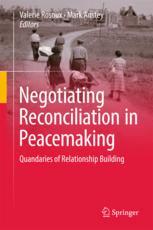

Most ebook files are in PDF format, so you can easily read them using various software such as Foxit Reader or directly on the Google Chrome browser.
Some ebook files are released by publishers in other formats such as .awz, .mobi, .epub, .fb2, etc. You may need to install specific software to read these formats on mobile/PC, such as Calibre.
Please read the tutorial at this link: https://ebookbell.com/faq
We offer FREE conversion to the popular formats you request; however, this may take some time. Therefore, right after payment, please email us, and we will try to provide the service as quickly as possible.
For some exceptional file formats or broken links (if any), please refrain from opening any disputes. Instead, email us first, and we will try to assist within a maximum of 6 hours.
EbookBell Team

5.0
40 reviewsThis book offers a unique approach to reconciliation as a matter for negotiation, bringing together two bodies of theory in order to offer insights into resolving conflicts and achieving lasting peace. It argues that reconciliation should not be simply accepted as an ‘agreed-upon norm’ within peacemaking processes, but should receive serious attention from belligerents and peace-brokers seeking to end violent conflicts through negotiation.
The book explores different meanings the term ‘reconciliation’ might hold for parties in conflict - the end of overt hostilities, a transformation in the quality of relations between warring groups, a vehicle of accountability and punishment of human rights abusers or the means through which they might somehow acquire amnesty, and as a means of atonement and to material reparation. It considers what gives energy to the idea of reconciliation in a conflict situation—why do belligerents become interested in settling their differences and changing their attitudes to one another? Using a range of case studies and thematic discussion, chapters in this book seek to tackle these tough questions from a multidisciplinary perspective.